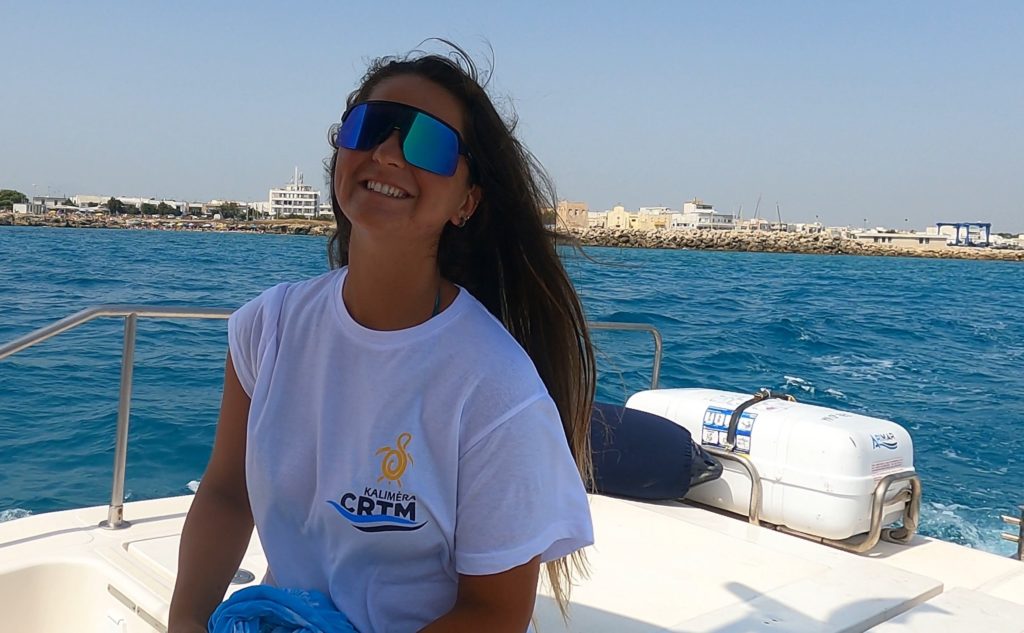Her phd thesis is investigating the last 150 years of Como Lake, analyzing sediments using different techniques: microplastics extraction, diatoms analysis by microscope, eDNA to look for alien species and X-rays to understand more about the changes and impacts due to climate change.
She also works for the Blueat Project which encourages the induction of alien species to the Mediterranean diet, and how consumption of them can bring benefits to the marine ecosystem.
1. Hi Carlotta! Can you tell us why are you interested in marine ecosystems and if you have a strong personal connection to the Sea?
My connection with the Sea began since I was born because my father is a recreational fisher and he transmitted me the passion of the Sea to me. When I was younger I was used to go snorkeling every summer, this taught me how to recognize and respect the species under the sea.
I’ve been working as volunteer and partner of Fondazione Cetacea, an Ocean Conservation NGO, which in particular runs a Marine Turtles Recovery Centre based in Rimini. I am the responsible for the Citizen science activities of Fondazione Cetacea and last year (summer 2021) I was the Resident biologist on board of the sailing boat for the project “Sailing for Blue Life”. This project was a citizen science and divulgation project in which I was the researcher and the scuba diving instructor. Indeed on the boat I involved the people and students on board to collect underwater data offering them the possibility to get a Researcher Diver License. I think that teaching the conservation of the Sea is the best way to make people aware of what they can do to help the ecosystem.
Also this summer I worked for One Ocean Fundation (Project M.A.R.E) where I was the Researcher to get data about the state of healthy of the Mediterranean sea. I’ve collected samples of the zooplankton to do ecotossicological analysis, eDNA to monitor species and surveys of cetaceans.
The Octopus is my soulmate and I think I only feel really free when I am underwater because I can stop all the thoughts we have on the Earth. Making bubbles under the sea is the best way to deal with stress as well.
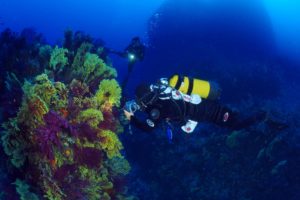
2. Through Fondazione Cetacea you work with sea turtles, can you tell us about some of the issues affecting the species found in the Mediterranean, and what you are doing to help?
In the Adriatic sea, the population of sea turtles (which we estimated through aerial surveys during the NetCet project) is approximately 5000 specimens, mostly located in the upper Adriatic, where they come to feed attracted by the large concentration of fish.
There are three species present in the Adriatic: the resident species is the Caretta caretta or Common Turtle, while the Chelonia Mydas (Green Turtle) and the Dermochelys coriacea (Leatherback Turtle) are occasionally found or sighted.
Cetacea Foundation works for the conservation of these species threatened mainly by human activity such as accidental interaction with professional fishing, pollution, waste, nautical traffic, climate change. The work with the turtles is mainly recovery, care and release, the monitoring of dead specimens on the coasts, the environmental education of the public and in the schools, the sensitization of the professional and sports categories related to the sea in order to reduce accidental catches and teach first aid maneuvers.
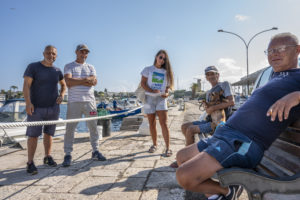

In the Adriatic sea, the population of sea turtles (which we estimated through aerial surveys during the NetCet project) is approximately 5000 specimens, mostly located in the upper Adriatic, where they come to feed attracted by the large concentration of fish.
There are three species present in the Adriatic: the resident species is the Caretta caretta or Common Turtle, while the Chelonia Mydas (Green Turtle) and the Dermochelys coriacea (Leatherback Turtle) are occasionally found or sighted.
The main issue that brought Sea turtles to us is the problem of bycatch: the accidental capture of turtles; they aren’t able to get out from the net so they can drown. Other problems are due to the marine litter, in particular, plastic that can be ingested because it looks like jellyfish, which are part of the Turtles ‘diet. One more problem is the changing of Temperature; because of the warmer temperature, the turtles follow their prey so they stay close to the coast and are caught by fishermen. Sometimes these turtles present injures due to the boats and fishermen. When there is a rapid decrease in temperature during the Winter season the turtles can go into hypothermia condition.
Cetacea Foundation works for the conservation of these species threatened mainly by human activity such as accidental interaction with professional fishing, pollution, waste, nautical traffic and climate change. The work with the turtles also includes the monitoring of dead specimens on the coasts, the environmental education of the public, in schools and with the professional and sports categories related to the sea in order to reduce accidental catches and teach first aid maneuvers. We work, through European projects, with fishermen to teach them how to act if they catch Sea turtles and we collaborate with them so if they catch some turtles with injuries they have to contact us. We take care of them in the Recovery Centre and when they are able to survive we lead them free into the sea.
3. Can you explain more about the “Blueat” project that incorporates alien species into cuisine?
Blueat opens up new scenarios on the management and use of Alien Species which, due to the transformation of the marine environment, are and will be increasingly present in the Mediterranean.
The Blueat project aims introduce these fish species to the gastronomic tradition of our country as soon as possible and consequently transform an emergency for the marine / terrestrial ecosystem into an economic resource for the Italian agri-food market. The project is designed to produce a beneficial result for the sea, for the ecosystem, for the indigenous fauna, for fishing and for seaside tourism; limiting the impact on the environment and on the socio-economic system that could be achieved if this “invasion” will not be controlled.
Blueat’s Objectives are:
1. Enhance and convert small-scale fishing and traditional fishing into sustainable fishing. Collaborating with fishermen and their local cooperatives for the sustainable capture of alien species; Experimenting with new target fishing equipment and methods; Involving Universities and Research Bodies.
2. Implement food consumption and cooking of alien species with the aim of including them in traditional italian gastronomy. Promoting them in markets, restaurants and the Horeca sector; Advertising them through social media, television and other mass media as well as innovative applications; Organizing fairs, events, congresses, study and research laboratories, show-cooking.
3. Shifting the focus of fish market demand from traditional target species to alien species. By helping to create an innovative micro-supply chain of the alien resource, which can be replicated in every coastal area of the country; Advertising and enhancing the environmental and socio-economic sustainability objectives; Enhancing the nutritional and gastronomic values.
4. As a Young person – and an “Early Career Ocean Professional” what would you say to others thinking about working in this sector? Do you have advice? Would you recommend it? What do you find difficult?
Sometimes it happens that a young student asks me this and I normally answer that studying marine biology was the best choice of my life. I decided I wanted to became a marine biologist when I was 6 years old and since that time everyone has tried to change my mind ( apart from my parents that has supported me) because they said I wouldn’t find real work with this type of graduation.
I suggest to do what people love and I would like to add that in this sector now there is lots of work to do because there is a big attention to the Ocean ecosystem, so this is the best moment to fight for a common goal. I absolutely recommend this sector.
My advice is to believe always in something and to invest in networking with different people in order to be more connected. Try to achieve your aims step by step.
The most difficult part is working with fishermen because traditional the maritime sector has been a male sector so it is not so easy for a young girl to interact with them. But something is changing and I think we can do something great with this program and with the relationships we can create thanks to it.
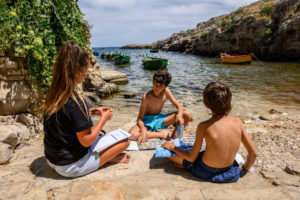
5. As we are now heading towards the end of the second year of the Decade of Ocean Science, what challenges or outcomes are you working towards and how do you think we can achieve “the Science we need for the Ocean we want by 2030”.
Blueat project participates in the sustainable development goals of the United Nations 2030 Agenda:
- 2: zero hunger
- 5: Gender Equality
- 8: Decent Work and Economic Growth
- 12: Responsible Consumption and Production
- 14: Life Below Water
I think we can only achieve the goals of the Agenda 2030 by collaborating together. We need to network and support each other because I think it is necessary to put together the knowledge from all of us to save our planet.
Thanks for your time Carlotta, great to meet you and thanks for sharing the amazing work you are doing for the Ocean!
